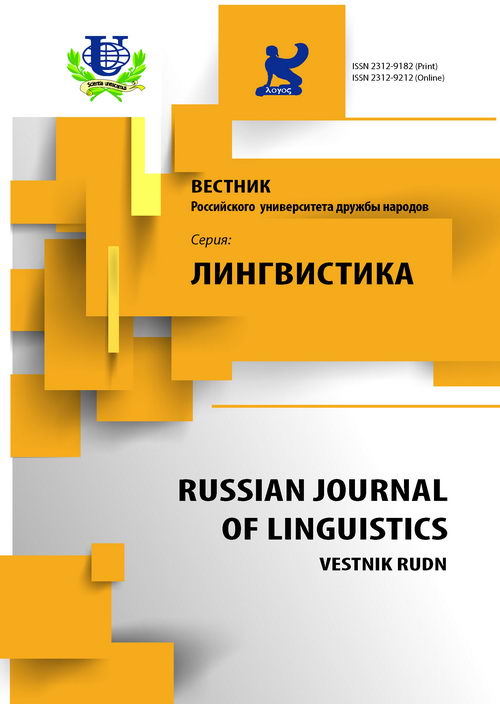Emotions in Impolite and Rude Communication
- Authors: Kharlova M.L1
-
Affiliations:
- Peoples’ Friendship University of Russia
- Issue: No 3 (2015)
- Pages: 84-98
- Section: Articles
- URL: https://journals.rudn.ru/linguistics/article/view/9428
- ID: 9428
Cite item
Full Text
Abstract
Impoliteness and rudeness trigger negative emotional reactions in interlocutors. The aim of this article is to analyze negative emotions which representatives of Russian and American communicative cultures feel during impolite and rude communication. The research is done on the basis of the data of emotional reactions obtained from the undertaken sociolinguistic study, as well as on the spoken discourse found in the Russian National Corpus, the Corpus of Contemporary American English and the Internet. The current study is based on research in the theory of impoliteness and rudeness, linguistics of emotions and linguoculturology. The analysis and the key findings of the data support the hypothesis that Russians and Americans have similar basic emotions, in particular, the emotions of anger and sadness . The comparative analysis of the semantics of the words, nominating the emotions of anger and sadness prove different ethnocultural content of the corresponding emotional concepts, which should be considered in research on impoliteness and rudeness in the linguocultural aspect. Negative emotions can cause reverse impoliteness and rudeness, however, their realization in both linguocultures is determined by the pragmatic context. Nevertheless, the findings show differences in the extent of communicative restraint of Russians and Americans. The main research methods used in the study are sociolinguistic survey, corpus data analysis, conceptual analysis, descriptive and comparative methods.
About the authors
Margarita L Kharlova
Peoples’ Friendship University of RussiaDepartment of Foreign Languages Faculty of Philology
References
- Александрова З.Е. Словарь синонимов русского языка. Практический справочник. М.: Русский язык, 2011. URL: http://dic.academic.ru/dic.nsf/dic_synonims/262586.
- Англо-русский и русско-английский словарь Мультитран. URL: http://www.multitran.ru.
- Большой толковый словарь русских глаголов. М.: АСТ-Пресс Книга. Составители: Л. Бабенко, И. Волчкова, Ю. Казарин, М. Кусова, М. Мухин, А. Плотникова, Е. Плотникова, Т. Попова, Т. Сивкова. 2009. URL: http://verbs_ru.academic.ru.
- Вежбицкая А. Семантические универсалии и описание языков. М.: Языки русской культуры, 1999.
- Вежбицкая А. Сопоставление культур через посредство лексики и прагматики / Пер. с англ. А.Д. Шмелева. М.: Языки славянской культуры, 2001. (Язык. Семиотика. Культура. Малая серия).
- Вежбицкая А. Семантические универсалии и базисные концепты. М.: Языки славянских культур, 2011. (Язык. Семиотика. Культура).
- Даль В.И. Толковый словарь живого великорусского языка В.И. Даля / Под ред. проф. И.А. Бодуэна-де-Куртенэ, 1903. Издание в 4 томах.
- Ефремова Т.Ф. Новый словарь русского языка. Толково-словообразовательный. М.: Русский язык, 2000. URL: http://dic.academic.ru/contents.nsf/efremova.
- Женский журнал Woman.ru. URL: http://www.woman.ru/psycho/medley6/thread/4497432.
- Изард К.Э. Психология эмоций. Перев. с англ. СПб.: Питер, 2009. 464 с.: ил. (Серия «Мастера психологии»).
- Лаврищева Е.В. Репрезентация негативных эмоций в языковой картине мира русского и немецкого языков (на материале соматической лексики) // Вестник Иркутского государственного лингвистического университета. 2010. Выпуск № 3. С. 27-33.
- Ларина Т.В. Категория вежливости и стиль коммуникации: Сопоставление английских и русских лингвокультурных традиций. М.: Рукописные памятники Древней Руси, 2009. (Язык. Семиотика. Культура).
- Ларина Т.В. Прагматика эмоций в межкультурном контексте // Вестник РУДН. Серия «Лингвистика». 2015. № 1. С. 144-163.
- Национальный корпус русского языка. URL: http://ruscorpora.ru.
- Ожегов С.И., Шведова Н.Ю. Словарь русского языка: Ок. 57 000 слов / Под ред. докт. филол. наук, проф. Н.Ю. Шведовой. 16-е изд., испр. М.: Русcкий язык, 1984. URL: http://www.ozhegov.org.
- Ушаков Д.Н. Толковый словарь русского языка: в 4 т. URL: http://www.ushakovdictionary.ru.
- Щербинина Ю.В. Речевая агрессия. Территория вражды: учебное пособие. М.: ФОРУМ, 2013.
- Шаховский В.И. Эмоции - мотивационная основа человеческого сознания // Вопросы психолингвистики. 2006. 4. С. 64-69.
- Шаховский В.И., Солодовникова Н.Г. Лингвоэкология: объект, предмет и задачи, 2011. URL: http://uapryal.com.ua/training/shahovskiyv-i-solodovnikova-n-g.
- Шаховский В.И. Эмоции: Долингвистика, лингвистика, лингвокультурология. Изд. 2-е. М.: Книжный дом «ЛИБРОКОМ», 2013.
- Харлова М.Л. Невежливость и грубость в коммуникативном сознании русских и американцев. Функционально-когнитивный анализ языковых единиц и его аппликативный потенциал: материалы II международной научной конференции, Барнаул, 8-10 октября 2014 г. / под ред. И.Ю. Колесова. Барнаул: АлтаГПА, 2014. С. 290-294.
- Culpeper J. Impoliteness: Using Language to Cause Offence. Cambridge University Press, 2011.
- Collins English Dictionary. URL: http://www.collinsdictionary.com.
- Corpus of Contemporary American English. URL: http://corpus.byu.edu/coca.
- Ekman P. Micro expressions, 2015. URL: http://www.paulekman.com/micro-expressions.
- Kienpointner M. Impoliteness and emotional arguments // Journal of Politeness Research: Language, Behaviour, Culture. 2008. Vol. 4. N 2. P. 243-265.
- Longman Dictionary of Contemporary English Online. URL: http://www.ldoceonline.com.
- Mesquita B., Walker R. Cultural differences in emotions: a context for interpreting emotional experiences // Behaviour Research and Therapy. 2003. 41. P. 777-793.
- Oxford Dictionaries. URL: http://www.oxforddictionaries.com.
- Форум Eka-mama.ru. URL: http://eka-mama.ru/forum/part17/topic327700.
Supplementary files















